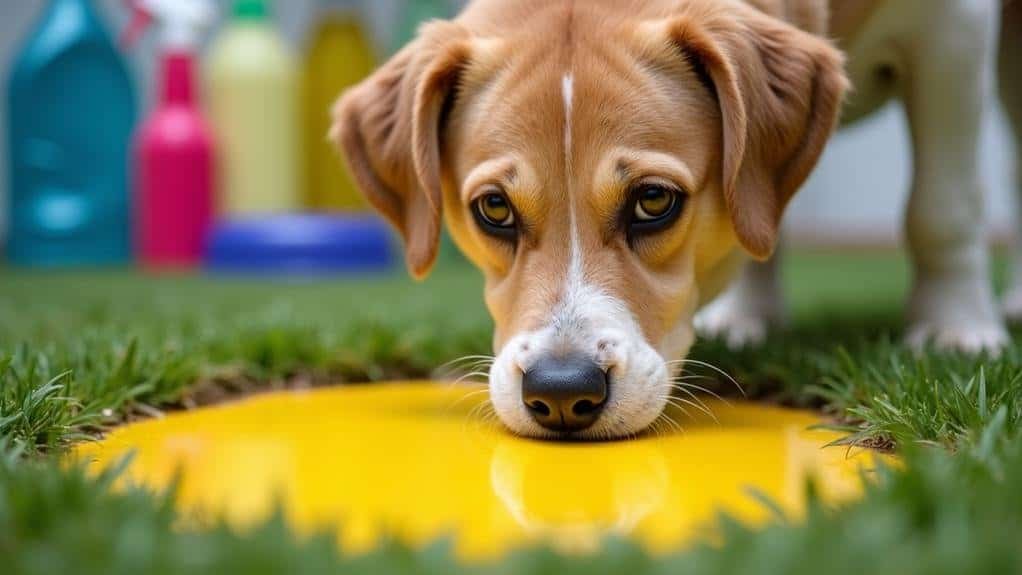Your dog's pee can smell bad due to various factors. Common causes include dehydration, diet, and medical conditions. A high-protein diet or low-quality food can intensify urine odor, while insufficient water intake concentrates waste products. Urinary tract infections often produce a fishy smell, and kidney issues may cause a metallic scent. Hormonal changes in intact males can also lead to stronger-smelling urine. To address this, make certain your dog stays hydrated, feed a balanced diet, and clean accidents promptly with enzyme cleaners. If the odor persists or is accompanied by other symptoms, it's essential to consult your veterinarian for a proper diagnosis and treatment plan.
Common Causes of Smelly Urine
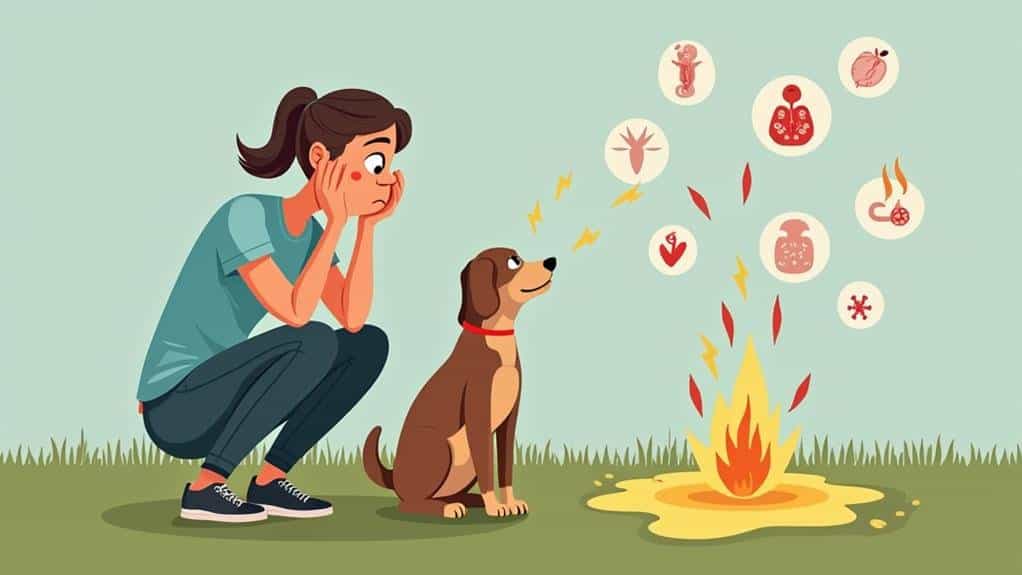
Sniffing out the reasons behind your dog's smelly urine can help you address the issue more effectively. Your furry friend's pee might've a strong odor due to several factors. Ammonia, bacteria, uric acid, and hormones naturally present in urine can intensify over time, creating an unpleasant smell.
If you notice a particularly foul odor, resembling rotten fish, it could indicate a Urinary Tract Infection (UTI). This condition requires prompt veterinary attention to prevent complications.
Another serious concern is kidney disease, which can cause your dog's urine to emit a metallic or foul smell. This symptom may signal underlying health issues that need immediate medical intervention.
Dehydration can also contribute to smelly urine by concentrating waste products. Make sure your dog always has access to fresh water to maintain proper hydration and urinary health.
For intact male dogs, hormonal changes can lead to stronger-smelling urine due to the effects of steroids. If the odor persists or worsens, consult your veterinarian to rule out any health problems.
Medical Conditions and Odors
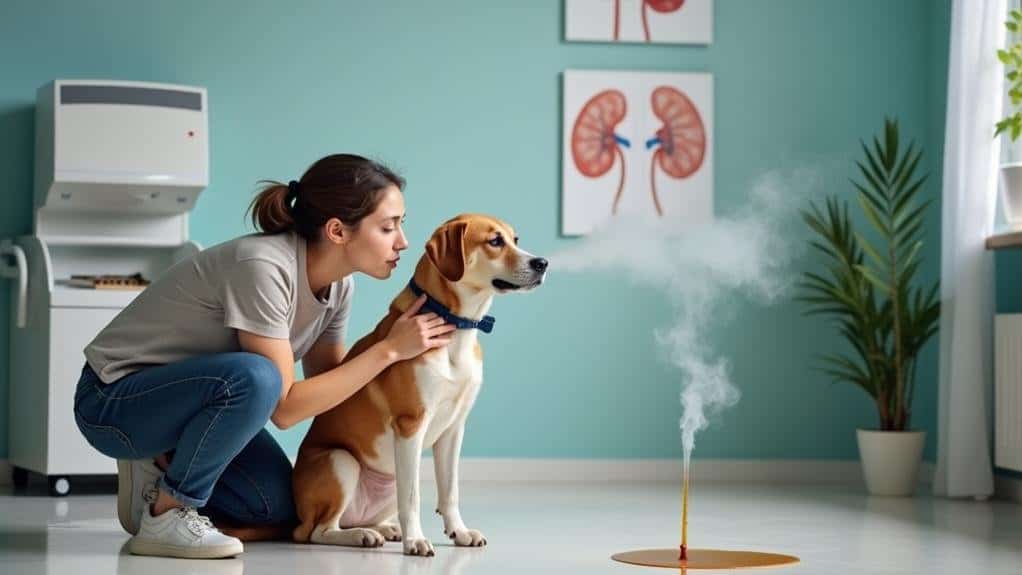
While some urine odors are normal, certain smells can signal serious medical conditions in your dog. If you notice your dog's urine smells like rotten fish, it could indicate a urinary tract infection. Bacteria breaking down urea in the bladder often cause this distinctive odor. Don't ignore it, as it requires prompt veterinary attention.
A metallic scent in your dog's smelling urine might point to kidney disease. This condition affects urine production and can lead to a buildup of toxins, altering the urine's smell. If you detect this odor, schedule a vet visit immediately.
Blood in the urine, which can change its scent, may signify bladder irritation or even cancer. This requires urgent medical evaluation. Increased urination frequency or sudden changes in odor could also indicate underlying medical issues like diabetes or Cushing's disease.
Keep an eye on your dog's urine clarity too. Cloudy urine might suggest the presence of crystals or a bacterial urinary infection. These conditions can seriously impact your dog's health if left untreated.
Diet's Impact on Urine Smell
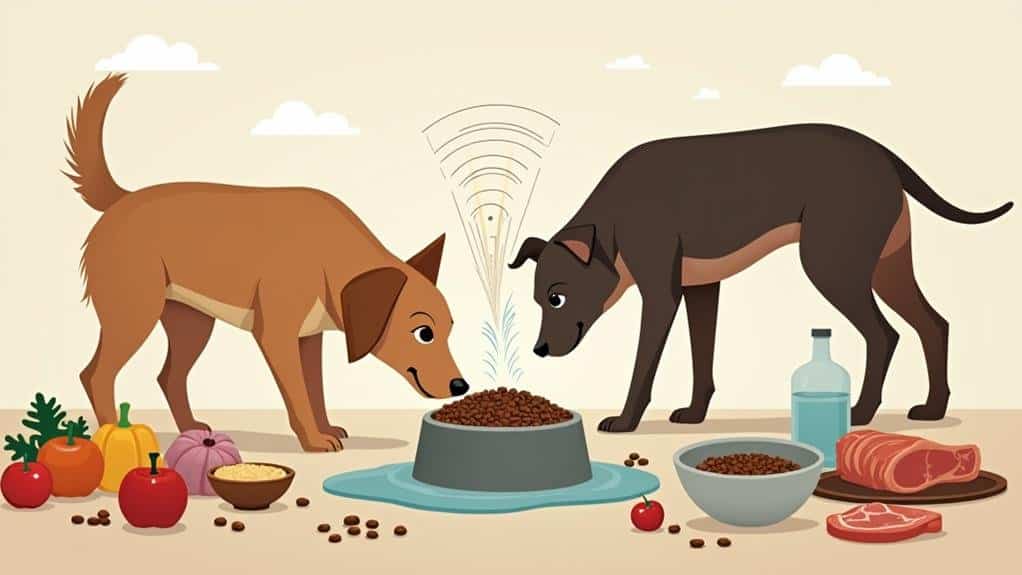
Your dog's diet plays an essential role in determining their urine's smell. High-protein and raw food diets can intensify the odor due to increased ammonia concentration. If you've noticed a particularly strong dog urine stain smell, it might be time to reassess your pet's food diet.
Low-quality commercial dog foods with fillers or artificial additives often lead to pungent urine odors. These ingredients can cause poor digestion and nutrient absorption, resulting in stronger-smelling waste.
Additionally, certain foods like asparagus or beetroot can alter your dog's urine scent and color, making it more noticeable.
To get rid of the smell, consider switching to a balanced, nutrient-dense diet. This change can promote better digestion and hydration, reducing unpleasant odors.
Ascertain your dog drinks enough water, as dehydration can concentrate urine and intensify its smell.
Hydration and Urine Odor
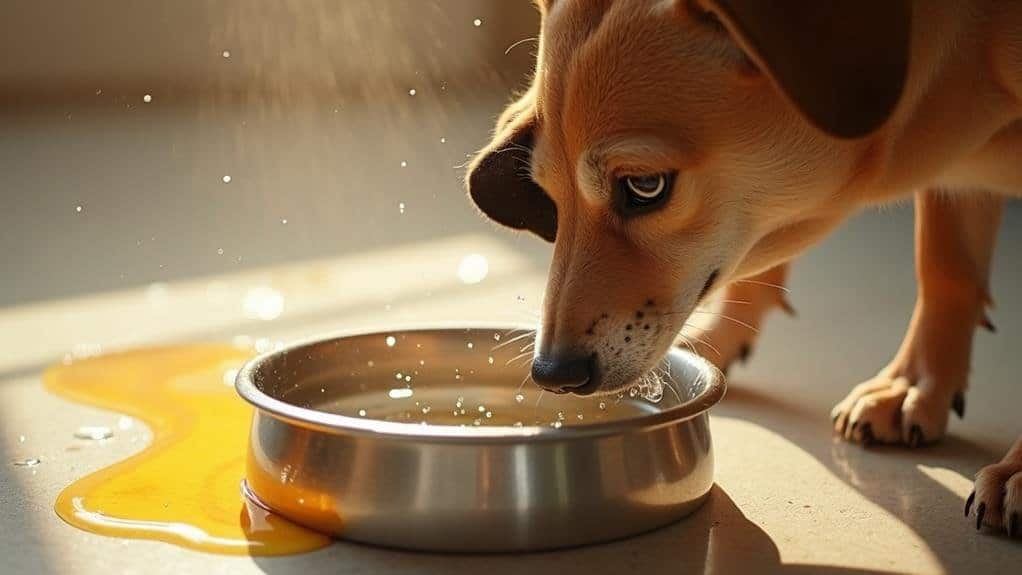
Proper hydration frequently plays an essential role in managing your dog's urine odor. When your canine companion is well-hydrated, their urine becomes more diluted, resulting in a clearer appearance and less pungent smell. This is because concentrated urine contains higher levels of waste products like ammonia and uric acid, which contribute to stronger, more unpleasant odors.
To promote better hydration, guarantee your dog always has access to fresh water. Consider using pet water fountains to encourage increased water intake, as some dogs prefer moving water sources. By maintaining adequate hydration, you'll help reduce the intensity of your dog's urine odor and support their overall urinary health.
It's important to monitor your dog's drinking habits and urine concentration, as changes can indicate underlying health issues. Regularly observing urination patterns and providing ample water access can help prevent the development of foul-smelling urine.
If you notice persistent strong odors or changes in your dog's urine despite proper hydration, consult your veterinarian to rule out any potential health concerns.
Cleaning and Odor Elimination Techniques
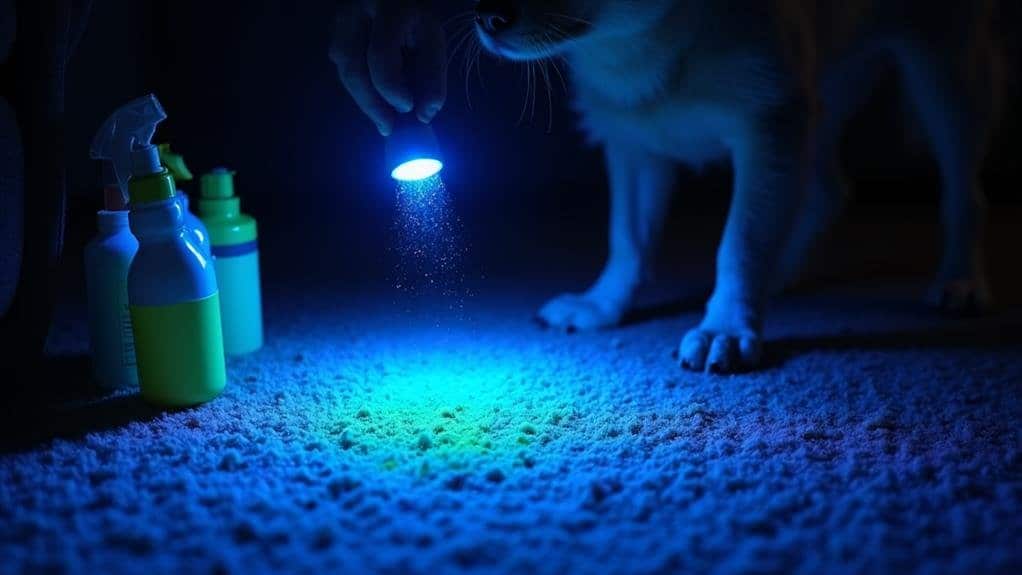
Tackling dog urine odors head-on requires effective cleaning and odor elimination techniques. Understanding the root cause of the smell is essential: ammonia, bacteria, and uric acid are the primary culprits.
To combat these effectively, you'll need to use cleaning methods that neutralize these compounds rather than just mask them.
Enzyme cleaners are your best bet for dog urine odor elimination. These powerful solutions break down organic materials in urine, effectively removing both stains and smells.
For immediate cleanup, try a simple mixture of equal parts water and white vinegar. This solution counteracts the alkaline nature of dog urine and helps neutralize odors.
To maintain a fresh environment and prevent odor build-up, consider these tips:
- Clean affected areas regularly, even if you don't see visible stains
- Use products containing natural enzymes, like Bio One Pet Odour Remover
- Act quickly when accidents occur to prevent deep-set stains and smells
When to Consult a Veterinarian
While managing dog urine odors is often a matter of cleanliness, there are five key situations when you should consult a veterinarian.
First, if you notice a foul, metallic smell in your dog's urine, it could indicate a urinary tract infection or kidney disease. Don't delay in seeking veterinary advice.
Second, unusual urination patterns, like increased frequency or straining, may suggest underlying health issues that require professional evaluation.
Third, the presence of blood in your dog's urine is a red flag that warrants an urgent vet visit. This could be a sign of bladder irritation or even cancer.
Fourth, significant changes in your dog's drinking habits or urine color should be discussed with a veterinarian. Dark yellow or red urine could indicate serious health concerns.
Finally, if you notice your dog excessively licking their genital area after urination, it might be a sign of irritation or infection.
In all these cases, prompt veterinary consultation is vital for your dog's health. Remember, early detection and treatment of urinary issues can prevent more serious complications and guarantee your furry friend's wellbeing.
Frequently Asked Questions
How Do You Cure Smelly Dog Urine?
To cure smelly dog urine, you'll need to identify the cause. Have your vet check for health issues, increase your dog's hydration, use enzyme cleaners, improve their diet, and monitor urination patterns. Address changes promptly for better urinary health.
What Can I Give My Dog to Neutralize His Urine?
You can give your dog more water to dilute urine, add fresh fruits and veggies to their diet, or try cranberry supplements. Consider probiotics for digestive health. Always consult your vet to rule out underlying issues.
How Do I Stop My Dogs Urine From Smelling so Strong?
To reduce your dog's strong urine smell, guarantee they're well-hydrated and feed them high-quality food. Clean urination areas with enzyme cleaners, monitor for health issues, and consider natural supplements. Regular vet check-ups can help address underlying causes of odor.
What Does It Mean When a Dog's Urine Smells Strong?
Your dog's strong-smelling urine could indicate dehydration, a urinary tract infection, or kidney issues. It might also result from their diet. If the odor persists, you should consult your vet for proper diagnosis and treatment.
Conclusion
You've learned about the various factors that can cause your dog's urine to smell bad. Remember, it's often a combination of diet, hydration, and overall health. Keep an eye on your pup's habits and urine odor, as it can signal underlying issues. If you're concerned, don't hesitate to consult your vet. With proper care, attention, and sometimes simple changes, you can help manage your dog's urine odor and guarantee their well-being.

